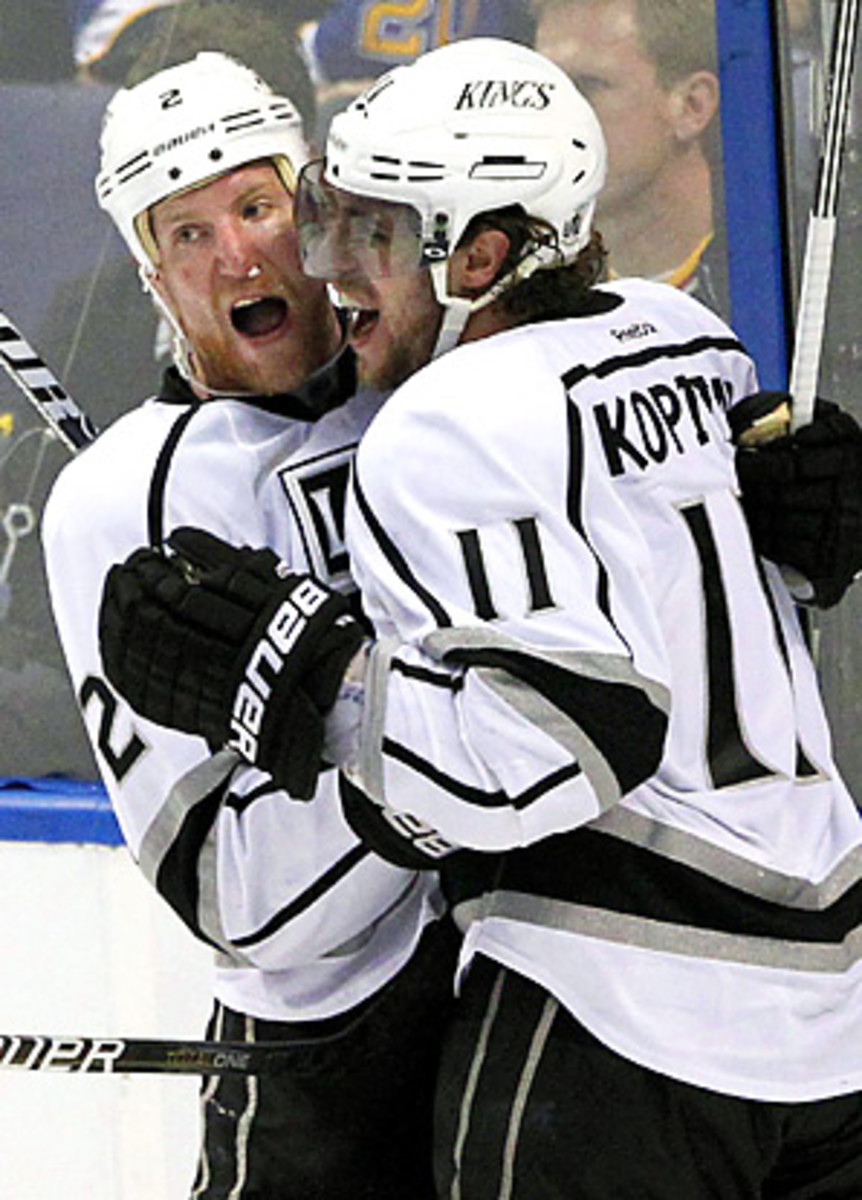Hitchcock's strategy a mystery
You live by the one-goal-lead, sit-back-and-trap-it-up-from-there-sword -- you die by the one-goal-lead, sit-back-and-trap-it-up-from-there-sword.
The St. Louis Blues were a victim of their own conservatism in Game 1 of their Western Conference semifinal series against the Los Angeles Kings, who went into the Scottrade Center and beat the Blues 3-1 Saturday night.
The right team won this game -- the tape of which will not be submitted to the Hockey Hall of Fame for viewing by future generations. It wasn't a very good game really, one filled with too much checkerboard mechanical decision-making and not enough pure playoff freelance hatred.
The Blues have fallen in love with a pullback method of hockey, and why not? They finished second in the Western Conference using it, and you'll never, ever catch me second-guessing Ken Hitchcock's mindset inside a 200x85-foot sheet of iced-over real estate.
But forgive this one observation of the kind of strategy that says:
"Get an early lead, and then just collapse your team around your goaltender and play the percentages from there and you'll probably win the hockey game."
It's too hard to play that way all the time.
Hitchcock has to believe one thing with this team of his: they're more than capable of winning a game by three or four goals. It doesn't always have to be up to the goalie and the defense to win in a lockdown mode just because the offense gets an early goal.
That's why the favored Blues lost this one as the No. 2 seed on home ice. They stopped doing the things that got them the lead in the first place. They went into DEFCON 4 mode after David Backes' goal 9:16 into the first period, but it was just too soon for that.
The Blues started playing like one goal was all they deserved to win by. They went into a layered defense, predicated on a dump-it-in, get-a-change-and-we'll-be-OK mindset.
Again, it was too soon for that.
The Kings' defense was treated to a more casual group of Blues forwards, making it easier for it to get the puck to the red line, dump it in, and get a good forecheck going from the forwards. It should have been the opposite, but Hitchcock's group forgot about the hard forechecking part. The Blues went to sleep, leading to the tying goal by Slava Voynov with 3:02 left in the first period. Voynov slipped in down the weak side and one-timed the crossing pass of Dustin Penner -- Dustin Penner -- for the equalizer past Brian Elliott.
It's easy to say in hindsight you had a feeling the Blues might have already cost themselves an easy Game 1 win by that point, but let's say it anyway: the Blues cost themselves an easy Game 1 win at that point.
The Blues got 13 shots on goal in the first period, and 16 on Jonathan Quick the final two. Why didn't they stick with the formula that got them the lead in the first place? Maybe that's too easy a criticism.
The Blues, after all, did lose valuable defender Alex Pietrangelo late in the second period after a high hit from Dwight King into the boards. We have to wait to see if "Petro", arguably the best and most important player on the Blues, is seriously hurt and might miss more time.
But the Kings capitalized on a more laissez-faire game plan from Hitchcock, with the winning goal coming from defenseman Matt Greene with 1:03 left in the second. Greene scored the goal, but Dustin Brown was the King who made it all happen.
After a faceoff win in his team's zone, Brown took the puck and sped down the right side of the ice before putting a shot on net that Elliott stopped. But nobody on the Blues seemed to think play would continue.
Elliott left a rebound in the crease that a charging Greene put in the net, a goal that nobody on the Blues seemed to think was possible because of how long the puck lay unattended after the save. But it was still live -- and Greene's recognition of that fact was largely why his team won.
"The puck was laying there, and I just took a chance and whacked at it, and it went in. It was a lucky bounce," Greene told NBC.
"'Brownie' made the play happen." The Blues have enough offense that they don't need to play like they did in Game 1. Does Hitchcock realize this? If he doesn't, it will be a shame for a team that has everything you'd want. But that's taking nothing away from a Kings team that is proving more resilient than Henry VIII.






